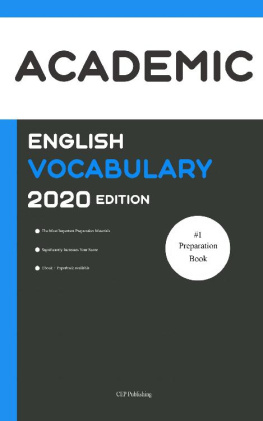Theme-based dictionary British English-Korean - 9000 words
By Andrey Taranov T&P Books vocabularies are intended for helping you learn, memorize and review foreign words. The dictionary is divided into themes, covering all major spheres of everyday activities, business, science, culture, etc. The process of learning words using T&P Books theme-based dictionaries gives you the following advantages: Correctly grouped source information predetermines success at subsequent stages of word memorization Availability of words derived from the same root allowing memorization of word units (rather than separate words) Small units of words facilitate the process of establishing associative links needed for consolidation of vocabulary Level of language knowledge can be estimated by the number of learned words Copyright 2016 T&P Books Publishing All rights reserved No part of this book may be reproduced or utilized in any form or by any means, electronic or mechanical, including photocopying, recording or by information storage and retrieval system, without permission in writing from the publishers. T&P Books Publishing
www.tpbooks.com ISBN: 978-1-78616-620-3 Smashwords Edition
KOREAN THEME-BASED DICTIONARY
British English collection
British English edition Contains the most commonly used words Recommended as an addition to any language course Meets the needs of beginners and advanced learners of foreign languages Convenient for daily use, reviewing sessions, and self-testing activities Allows you to assess your vocabulary T&P Books vocabularies are intended for helping you learn, memorize and review foreign words. This vocabulary contains over 9000 commonly used words arranged thematically. 256 themes cover all major aspects of everyday activities, business, science, culture, etc.
Foreign language learners often feel the necessity to enrich their vocabulary with new words and review the materials they have studied before in order to talk on different subjects more fluently and comprehensively. Conventional dictionaries with alphabetical arrangement of words fail to produce effective results, whereas theme dictionaries from T&P Books are specially designed to elevate the convenience of studying and revising the vocabulary. This vocabulary book can be used as an addition to a foreign language course textbook or a course. It will become an invaluable helper during a trip abroad. T&P Books dictionaries are particularly convenient to use for multiple reviewing, which is crucial for producing positive results in language learning.
ABBREVIATIONS
used in the dictionary
English abbreviations
ab. about
adj adjective
adv adverb
anim. animate
as adj attributive noun used as adjective
e.g. for example
etc. et cetera
fam. familiar
fem. feminine
form. formal
inanim. inanimate
masc. masculine
math mathematics
mil. military
n noun
pl plural
pron. pronoun
sb somebody
sing. singular
sth something
v aux auxiliary verb
vi intransitive verb
vi, vt intransitive, transitive verb
vt transitive verb
PRONUNCIATION GUIDE
Letter Korean example T&P phonetic alphabet English example
Vowels and combinations with vowels
[a] shorter than in ask [ja] Kenya, piano [] lucky, sun [j] young, yard [o] pod, John [j] New York [u] book [ju] youth, usually [] big, America [i], [i:] feet, Peter [], [:] habit, bad [je] yesterday, yen [e] elm, medal [je] yesterday, yen [wa] watt, white [] pure, fuel [], [we] first, web [u] to order, to open [] pure, fuel [wi] whiskey [i] combination [i]
Consonants
[k] clock, kiss [g] game, gold [k] tense [k] [n] name, normal [t] tourist, trip [d] day, doctor [t] tense [t] [r] rice, radio [m] magic, milk [p] pencil, private [b] baby, book [p] tense [p] [s] city, boss [t] tourist, trip [ja:] royal [g] language, single [] cheer [] jeans, gene [] tense [tch] [h] hitchhiker [th] dont have [kh] work hard [ph] top hat [h] home, have [l] lace, people
Comments
1 at the beginning of words 2 between voiced sounds 3 at the beginning of words 4 between voiced sounds 5 at the beginning of a syllable 6 at the end of a syllable 7 at the beginning of words 8 between voiced sounds 9 at the beginning of a syllable 10 at the end of a syllable 11 at the end of a syllable 12 at the beginning of words 13 between voiced sounds
BASIC CONCEPTS
Pronouns
I, me , na you neo he , geu, geu-bun she geu-nyeo it geu-geot we u-ri you (to a group) neo-hui you (polite, sing.) dang-sin they geu-deul
Greetings. Salutations. Farewells
Hello! (fam.) ! an-nyeong! Hello! (form.) ! an-nyeong-ha-se-yo! Good morning! ! an-nyeong-ha-se-yo! Good afternoon! ! an-nyeong-ha-se-yo! Good evening! ! an-nyeong-ha-se-yo! to say hello in-sa-ha-da Hi! (hello) ! an-nyeong! greeting (n) in-sa to greet (vt) in-sa-ha-da How are you? ? jal ji-nae-se-yo? What's new? ? eo-tteo-ke ji-nae? Bye-Bye! Goodbye! ! an-nyeong-hi ga-se-yo! See you soon! ! tto man-na-yo! Farewell! (to a friend) ! jal ri-seo! Farewell! (form.) ! an-nyeong-hi gye-se-yo! to say goodbye jak-byeo-rin-sa-reul ha-da Cheers! ! an-nyeong! Thank you! Cheers! ! gam-sa-ham-ni-da! Thank you very much! ! dae-dan-hi gam-sa-ham-ni-da! My pleasure! cheon-man-i-e-yo Don't mention it! cheon-man-ui mal-sseum-im-ni-da It was nothing cheon-man-e Excuse me! (fam.) ! sil-lye! Excuse me! (form.) ! sil-lye-ham-ni-da! to excuse (forgive) yong-seo-ha-da to apologize (vi) sa-gwa-ha-da My apologies sa-gwa-deu-rim-ni-da I'm sorry! ! joe-song-ham-ni-da! to forgive (vt) yong-seo-ha-da please (adv) bu-tak-am-ni-da Don't forget! ! it-ji ma-sip-si-o! Certainly! ! mul-lon-i-e-yo! Of course not! ! mul-lon a-ni-e-yo! Okay! (I agree) ! geu-rae-yo! That's enough! ! geu-man!
How to address
mister, sir seon-saeng madam yeo-sa-nim miss a-ga-ssi young man jeol-meun bun young man (little boy) kko-ma miss (little girl) kko-ma
Cardinal numbers. Part 1
0 zero yeong 1 one il 2 two i 3 three sam 4 four sa 5 five o 6 six yuk 7 seven chil 8 eight pal 9 nine gu 10 ten sip 11 eleven si-bil 12 twelve si-bi 13 thirteen sip-sam 14 fourteen sip-sa 15 fifteen si-bo 16 sixteen si-byuk 17 seventeen sip-chil 18 eighteen sip-pal 19 nineteen sip-gu 20 twenty i-sip 21 twenty-one i-si-bil 22 twenty-two i-si-bi 23 twenty-three i-sip-sam 30 thirty sam-sip 31 thirty-one sam-si-bil 32 thirty-two sam-si-bi 33 thirty-three sam-sip-sam 40 forty sa-sip 41 forty-one sa-si-bil 42 forty-two sa-si-bi 43 forty-three sa-sip-sam 50 fifty o-sip 51 fifty-one o-si-bil 52 fifty-two o-si-bi 53 fifty-three o-sip-sam 60 sixty yuk-sip 61 sixty-one yuk-si-bil 62 sixty-two yuk-si-bi 63 sixty-three yuk-sip-sam 70 seventy chil-sip 71 seventy-one chil-si-bil 72 seventy-two chil-si-bi 73 seventy-three chil-sip-sam 80 eighty pal-sip 81 eighty-one pal-si-bil 82 eighty-two pal-si-bi 83 eighty-three pal-sip-sam 90 ninety gu-sip 91 ninety-one gu-si-bil 92 ninety-two gu-si-bi 93 ninety-three gu-sip-sam
Cardinal numbers. Part 2
100 one hundred baek 200 two hundred i-baek 300 three hundred sam-baek 400 four hundred sa-baek 500 five hundred o-baek 600 six hundred yuk-baek 700 seven hundred chil-baek 800 eight hundred pal-baek 900 nine hundred gu-baek 1000 one thousand cheon 2000 two thousand i-cheon 3000 three thousand sam-cheon 10000 ten thousand man one hundred thousand sim-man million baeng-man billion si-beok











